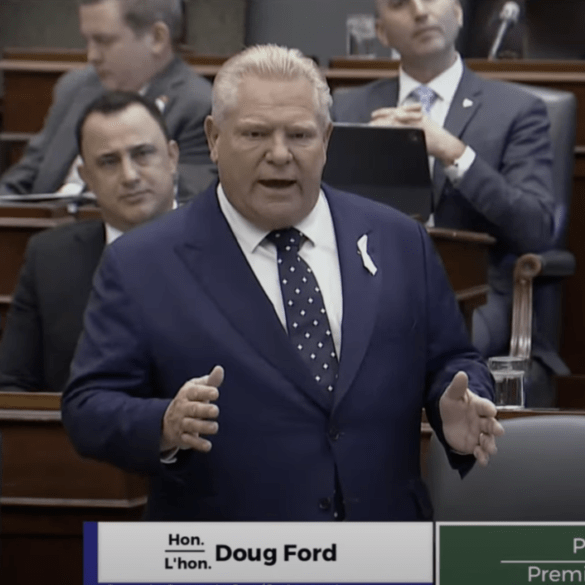The ad will be pulled on Oct. 27, after it airs during the weekend’s World Series games.

Ontario Premier Doug Ford speaks during Question Period at the Ontario Legislature on December 5th, 2024.(Screen shot)
Ontario Premier Doug Ford said following a discussion with Prime Minister Mark Carney his province will be pausing its TV advertising campaign that led U.S. President Donald Trump to end trade talks with Canada. The ad will be pulled on Oct. 27, after it airs during the weekend’s World Series games.
“In speaking with Prime Minister Carney, Ontario will pause its U.S. advertising campaign effective Monday so that trade talks can resume,” Ford said in a statement posted on social media on Oct. 24.
Ford said the intention of the TV advertisements, which featured late U.S. President Ronald Reagan speaking critically of tariffs, was to “initiate a conversation” about the U.S. economy and the impact of tariffs on workers and businesses.
“We’ve achieved our goal, having reached U.S. audiences at the highest levels,” he said.
Ford said he has directed his team to “keep putting our message in front of Americans over the weekend” so that the commercial can be aired during the first two World Series games.
On Oct. 23, Trump said in a post on Truth Social that trade negotiations with Canada were “hereby terminated” because of the ad campaign.
In a subsequent post on Oct. 24, Trump said Canada had “cheated and got caught” by presenting Reagan’s words “fraudulently” to make it seem like he was not in favour of tariffs, “when he actually loved tariffs for our country and its national security.”
Trump also accused Canada of using the ad to influence the U.S. Supreme Court in its ruling on Trump’s reciprocal tariffs. The court is set to hear oral arguments on the tariffs on Nov. 5, and Trump has said he may attend the hearing in person.
Speaking to reporters before flying to Asia on Oct. 24, Prime Minister Carney did not mention the ad specifically, but said Canada was ready to “pick up” on trade talks when the United States was ready. He said Canadian officials have had “detailed, constructive” negotiations with their American counterparts.
“A lot of progress has been made, and we stand ready to pick up on that progress and build on that progress when the Americans are ready to have those discussions,” he said.
Ad Campaign
The $75 million television ad campaign put out by the Ontario government shows a 1987 address by Reagan where, following his imposition of tariffs on Japan, he stated that imposing tariffs on foreign imports “sometimes” works to protect American products and jobs, “but only for a short time.”
“High tariffs inevitably lead to retaliation by foreign countries and the triggering of fierce trade wars. Then the worst happens: Markets shrink and collapse, businesses and industries shut down and millions of people lose their jobs,” Reagan said in the ad.
The Ronald Reagan Presidential Foundation and Institute later said on social media on Oct. 23 that the ad used selective audio of Reagan and “misrepresents” what he said about tariffs. The foundation said the Ontario government did not seek permission to use the remarks, and that it may pursue legal action against Ontario.
Ford had told reporters on Oct. 23 that the radio ad was “effective” and that he thought it would lead to infighting between “Reagan Republicans” and “the MAGA group” and said he hoped the Reagan Republicans “win.”
Ford had said on Oct. 16 that if Ottawa could not soon make a deal with Washington on tariffs, “let’s start hitting the U.S. back hard.” But Prime Minister Mark Carney said his government was not considering putting more retaliatory tariffs on American goods, instead focusing on advancing bilateral talks with the United States.
Throughout 2025, the United States has placed a wide range of tariffs on Canada, including 50 percent tariffs on steel, aluminum, and copper, 25 percent tariffs on vehicles and auto parts, 10 percent tariffs on oil and potash, and 25 percent tariffs on Canadian exports not covered under the United States-Mexico-Canada Agreement (USMCA), which were increased to 35 percent in August.
Ottawa has thus far been unable to reach a trade deal with the United States, but the Canadian minister responsible for U.S. trade, Dominic LeBlanc, said earlier in October that he remained hopeful the two sides could reach an agreement on tariffs before the review of the USMCA scheduled for 2026.
The Trump administration had previously announced on June 27 that it was ending trade negotiations with Canada over its recently introduced digital services tax, which would impose a new levy on revenue generated by digital services operating in Canada and impact American companies like Amazon and Netflix. Ottawa cancelled the new tax two days later, after which Washington said it would resume trade talks.
Ford’s office announced on Oct. 24 that two news conferences the premier was set to participate in had been cancelled.
Matthew Horwood is a reporter based in Ottawa.
